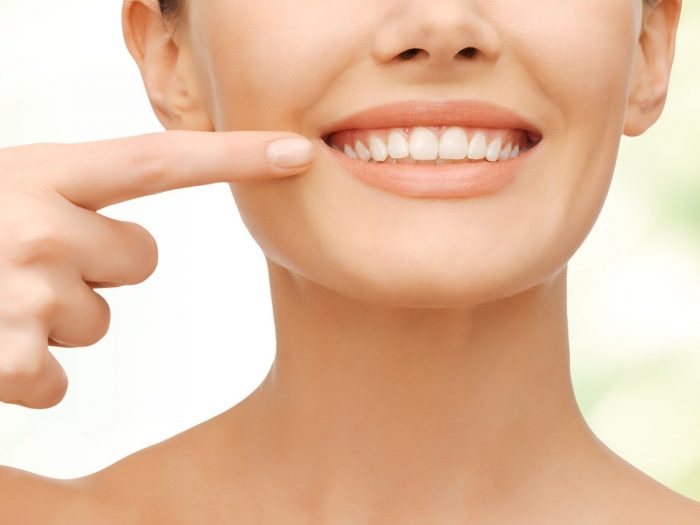While a lot of focus is placed on keeping our teeth clean and healthy, the importance of healthy gums is often forgotten. Maintaining good gum health is vital to ensuring your overall oral hygiene is as it should be, and by failing to do this, you put yourself at risk of numerous dental problems, the most common of which is gum disease.
Gum Disease
Gum disease is caused by a build-up of plaque on the teeth and gums and is characterized by red, bleeding gums, inflammation, and sensitivity. Plaque is a sticky, bacteria-filled substance that causes tooth decay if not regularly removed by a dental hygienist.

Practicing oral hygiene can help a person keep their gums healthy. Photo Credit: Shutterstock
Gum disease at its earliest stage is often referred to as gingivitis. The damage caused by gingivitis, although unpleasant, is often reversible. If gingivitis is left untreated, however, it can progress into periodontitis, which can irreversibly ruin the gums and cause teeth to fall out.
Symptoms of Unhealthy Gums
Unlike healthy gums, which are firm and light pink, unhealthy gums are deep red and may bleed when you brush them. Because gum disease causes gums to become inflamed, you may find your gums are swollen and tender to touch.
If you notice similar symptoms in your gums, it is important to seek advice from a dentist as soon as possible. These symptoms can easily be treated at this stage, but if you allow them to advance, you may cause permanent damage to your mouth.
More serious symptoms of gum disease may suggest periodontitis. The bones and tissues holding the teeth are damaged, causing teeth to loosen and fall out. Spaces develop between your teeth, and chewing solid foods becomes painful. [1]
You may also notice your gums are visibly receding, or pulling back from your teeth, making them appear longer.
Common Risk Factors to Avoid
If you are worried about developing gum disease, eliminate any risk factors. Although aging and genetics play a role in the development of gum disease, other factors can easily be avoided, helping you to prevent your risk of contracting the disease yourself.
- Smoking is one of the key risk factors of gum disease. Tobacco kills the good bacteria in your mouth and destroys the gum tissue surrounding your teeth, leading to irreparable damage.
- Another risk factor is consuming a poor diet. Eating high-sugar, processed foods can wreak havoc on your teeth over time by leaving sticky deposits on the teeth that cause decay.
- Alcohol should also be limited, as it causes the mouth to dry out, and a lack of saliva enables foods to stick to the teeth without being washed away.
Ways to Have Healthy Gums
It is key to remember that no matter what your age is, gum disease can be prevented. Even if you are experiencing gum disease in its early stages, it is possible to reverse your symptoms. [2]
For healthy gums, brush twice a day, floss regularly, pick a fluoride toothpaste, use mouthwash, and rinse carefully. Also, avoid drinking and smoking.
Brush Twice A Day
Aim to brush your teeth at least twice daily to stimulate the gums and remove plaque from the teeth. If possible, also brush your teeth after eating sugary snacks to immediately remove the sticky deposits before they can damage the enamel.
Floss Daily
Flossing is often ignored in the teeth-cleaning routine, but it is essential to maintain good oral hygiene. Any plaque or food deposits that have built up between teeth are easily removed by flossing, preventing the risk of tooth decay.
Choose Fluoride Toothpaste
Fluoride, a natural mineral found in water, soil, and some foods, is absorbed into the tooth’s enamel and helps to keep teeth strong and healthy, preventing decay. Not all kinds of toothpaste contain fluoride, so it is worth checking that yours does.
Rinse Carefully
It’s fine to rinse your mouth with water once you’ve brushed your teeth, but try not to do so excessively, as this can wash away the fluoride from your teeth. When rinsing with water, try to avoid swilling around your teeth, keeping the water at the back of your mouth.
Use Mouthwash
The benefits of mouthwash go far beyond freshening your breath. Rinsing once or twice daily with therapeutic mouthwashes kills bacteria and protects teeth from plaque build-up. Mouthwash should be used alongside brushing, and not as an alternative.
Quit Smoking and Drinking
As high-risk factors for the development of gum disease, smoking and drinking should be avoided to maintain good oral health. Not only will you be doing a favor to your mouth and gums, but your overall health will also benefit.
Visit a Dentist Regularly
Gum disease at any stage should never be ignored. If you have noticed any sensitivity, bleeding, or swelling of your gums, book an appointment to see your dentist for a check-up as soon as you can. The earlier you seek treatment, the better the outcome.
Your dentist will be happy to advise you on how you can personally ensure you are maintaining the best oral health and can offer support if preventative treatment is required.
